📋 Political Sociology: Essential Concepts for Reading Comprehension
Political sociology examines the relationship between society and political systems,
exploring how power, authority, and governance shape and are shaped by social structures.
This discipline delves into topics like ideologies, civil society, and state dynamics,
providing insights into how individuals and groups influence and are influenced by politics.
RC passages on political sociology often analyze these interactions to explain societal power
dynamics and collective behavior.
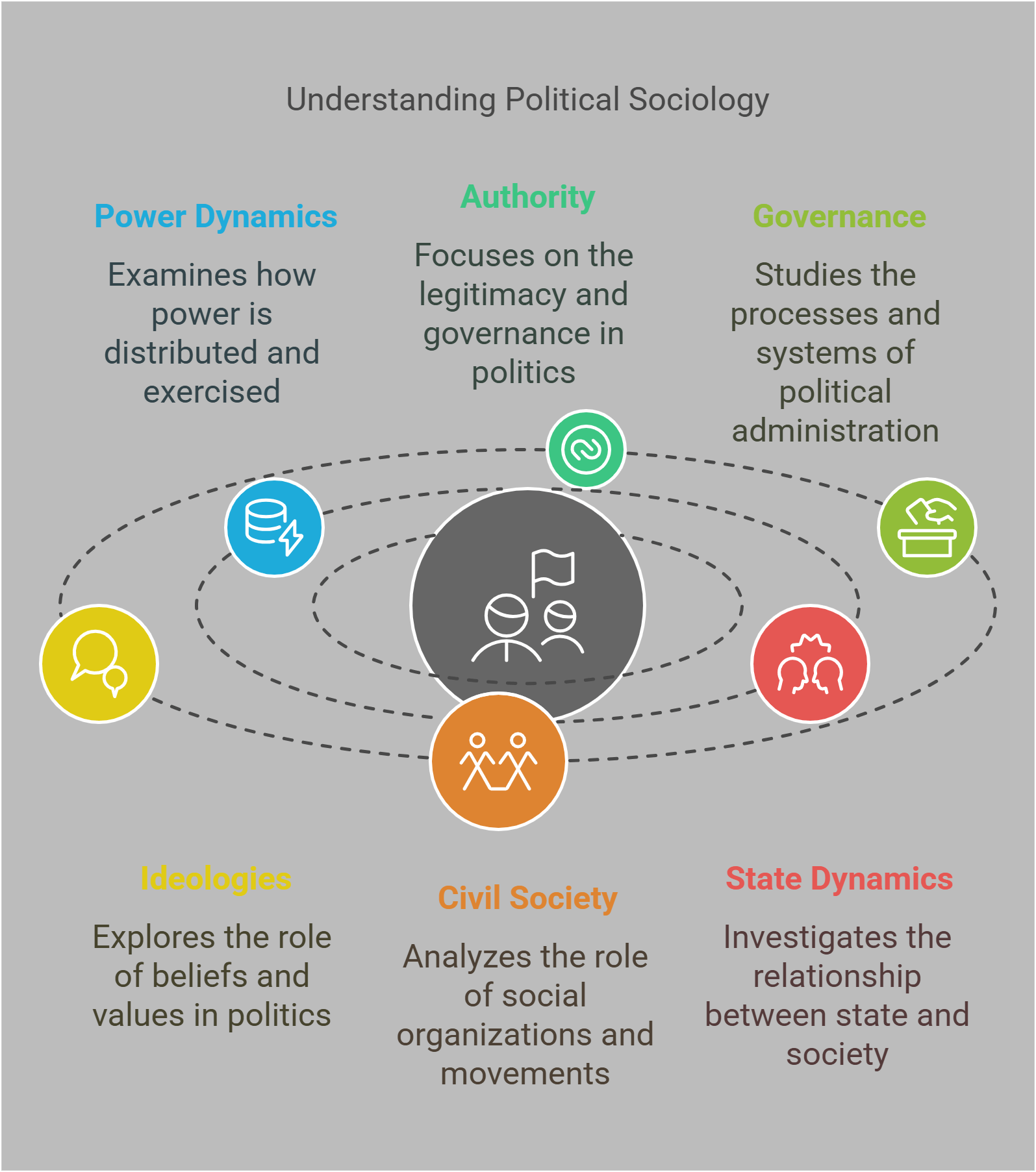
🔑 Key Concepts
- Power vs. Authority
- Political Ideologies
- Electoral Systems
- Social Movements
- Civil Society
- State vs. Nation
- Marxism vs. Pluralism
- Social Contract Theory
- Protest Tactics
- Citizenship
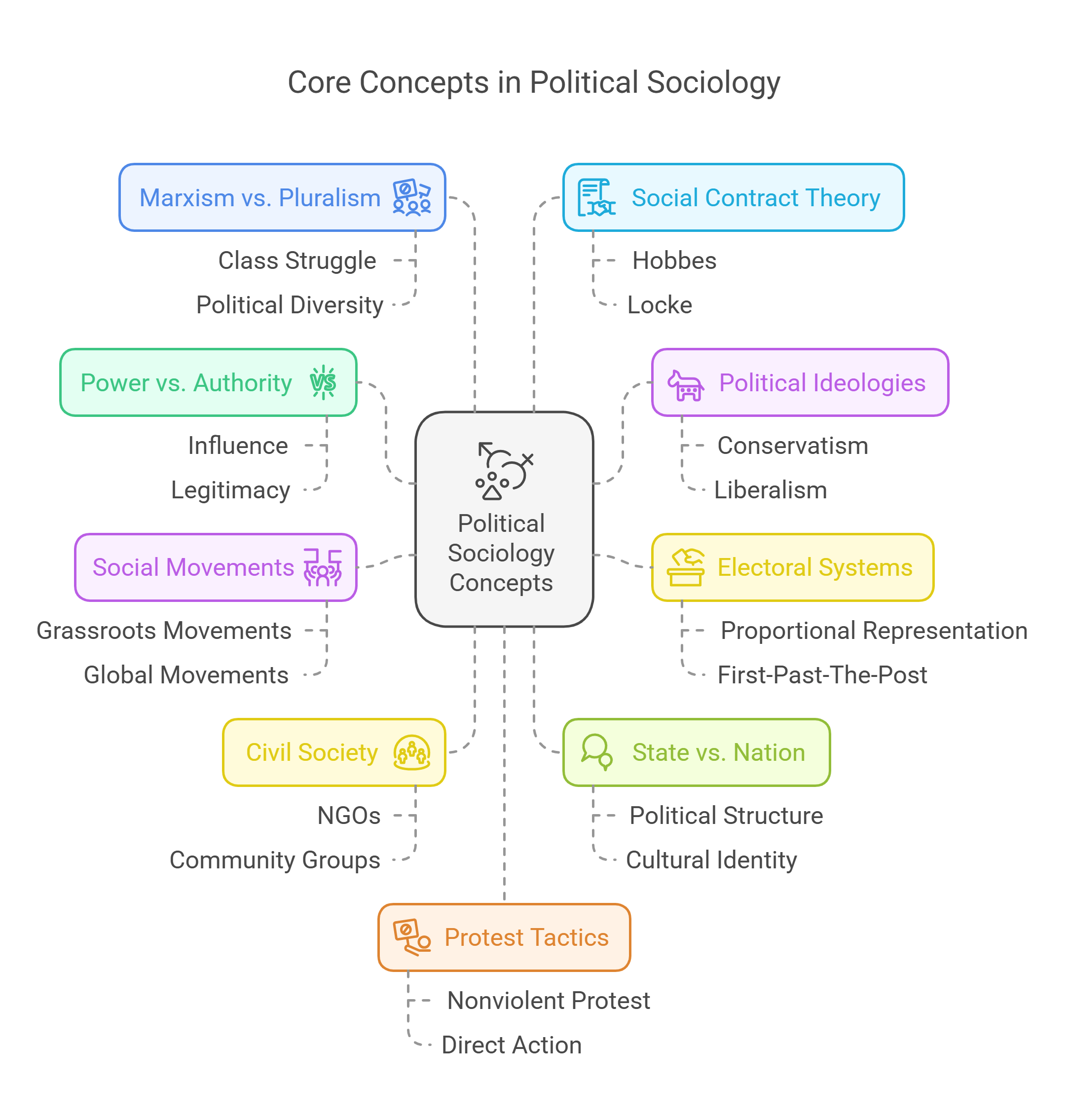
Power vs. Authority
Detailed Explanation: Power refers to the ability to influence or control others’
behavior, often through coercion or force. Authority, however, is power perceived as legitimate
and accepted by society. Max Weber classified authority into three types:
- Traditional: Based on customs (e.g., monarchies).
- Charismatic: Derived from an individual’s personal appeal (e.g., revolutionaries).
- Legal-Rational: Rooted in laws and institutions (e.g., democratic governments).
📘 Example: A police officer has authority to enforce laws, while a robber may exert power through intimidation.
Explained Simply: Power is like raw strength, while authority is strength backed by trust and legitimacy.
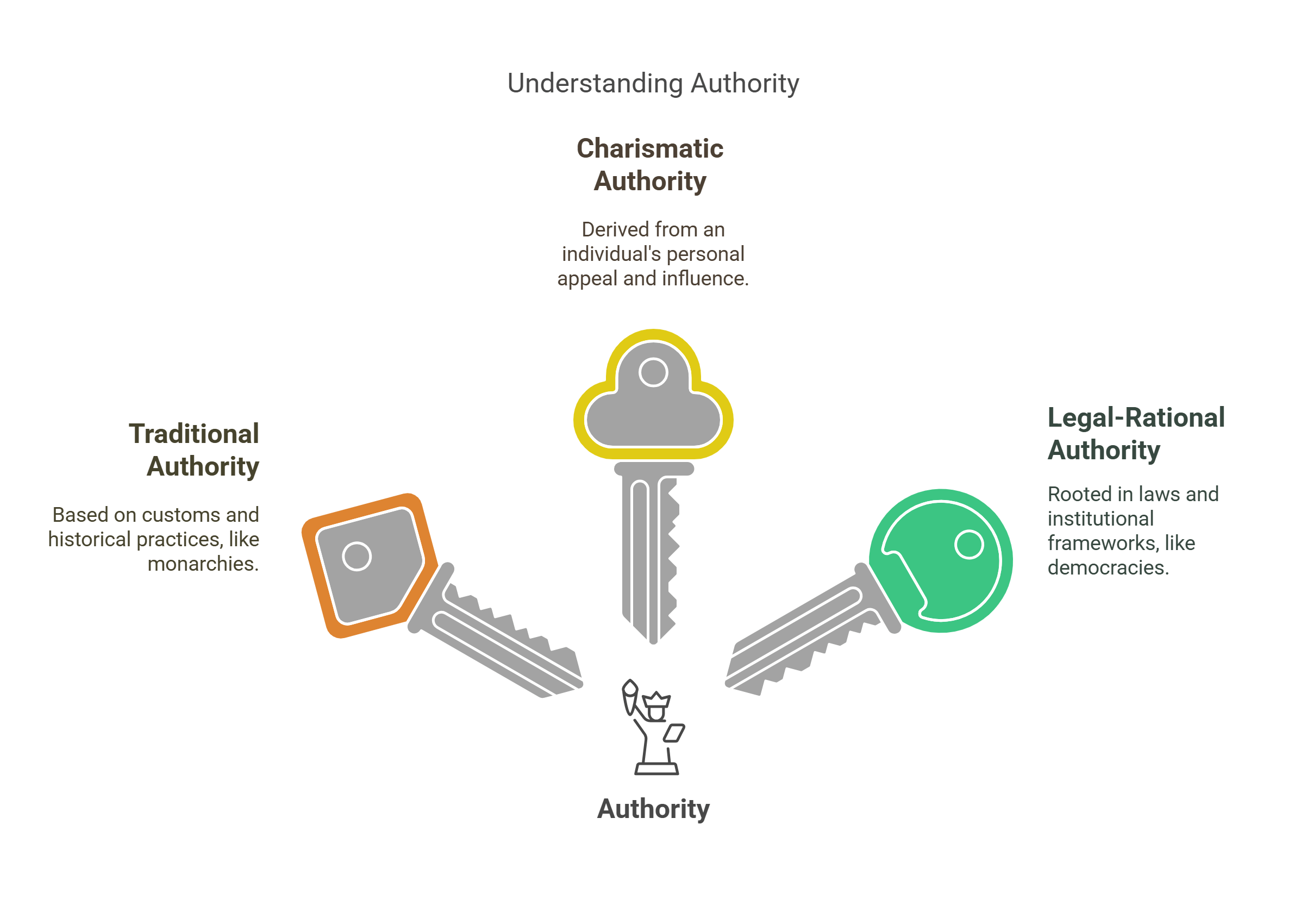
Political Ideologies
Detailed Explanation: Political ideologies are systems of beliefs and values about
the best way to organize society, guiding political behavior and policy-making.
- Liberalism: Advocates for individual freedom, democracy, and market-based economies.
- Conservatism: Emphasizes tradition, stability, and limited government intervention.
- Socialism: Focuses on social equality and collective ownership of resources.
- Fascism: Promotes authoritarian leadership, nationalism, and suppression of dissent.
- Anarchism: Opposes hierarchical authority and advocates for self-governed societies.
📘 Example: Liberalism underpins policies promoting free speech and civil rights, while socialism inspires welfare programs.
Explained Simply: Political ideologies are like blueprints for how society should function, each offering different designs.
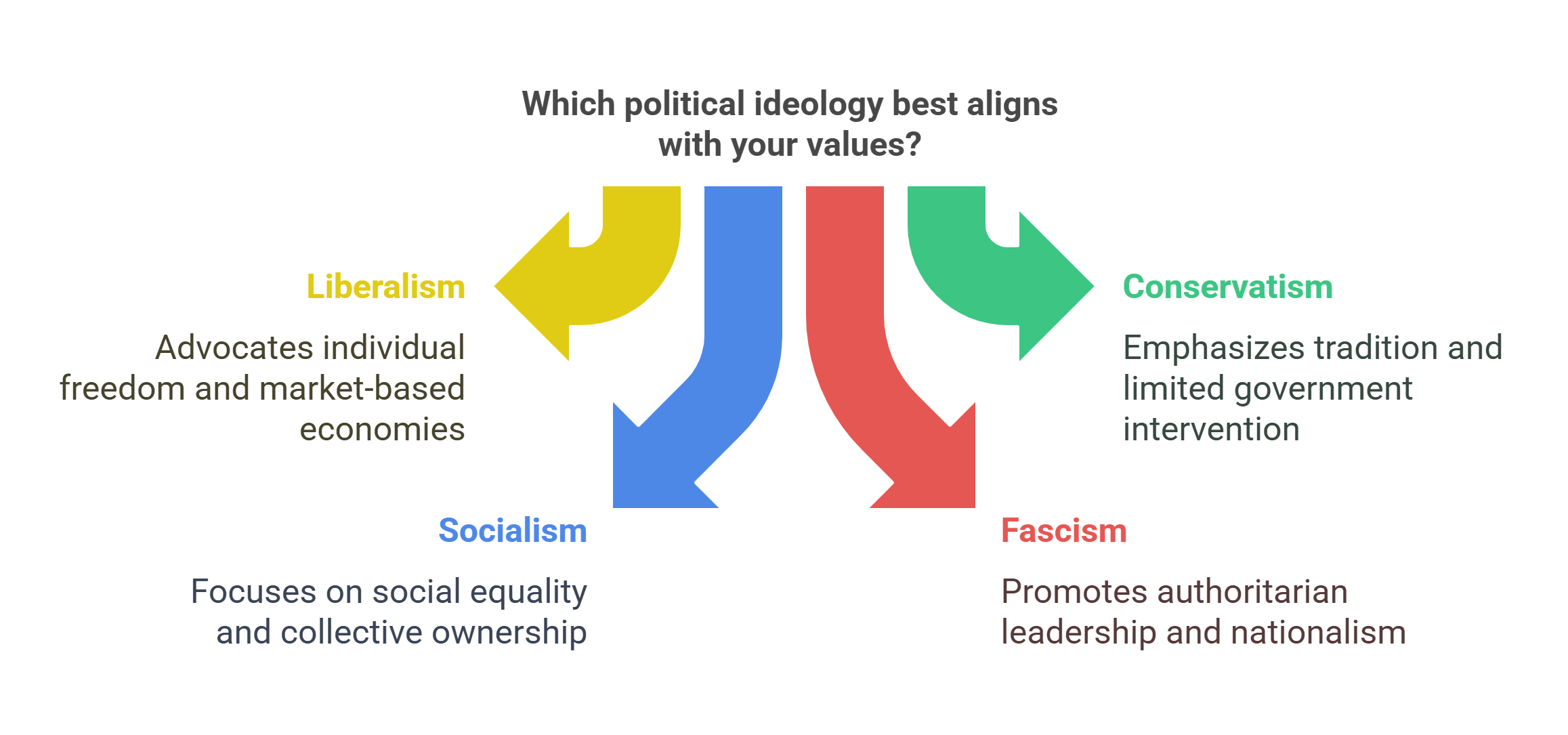
Electoral Systems
Detailed Explanation: Electoral systems determine how votes are translated into
political representation. They shape the dynamics of governance and party competition.
- First-Past-the-Post (FPTP): The candidate with the most votes wins, often leading to
two-party systems (e.g., U.S., U.K.). - Proportional Representation (PR): Seats are allocated based on the percentage of votes,
encouraging multiparty systems (e.g., Germany, Israel). - Mixed Systems: Combine elements of FPTP and PR (e.g., Japan).
📘 Example: FPTP favors larger parties, while PR allows smaller parties to gain representation.
Explained Simply: Electoral systems are like the rules of a game, determining how players (parties) win or lose.
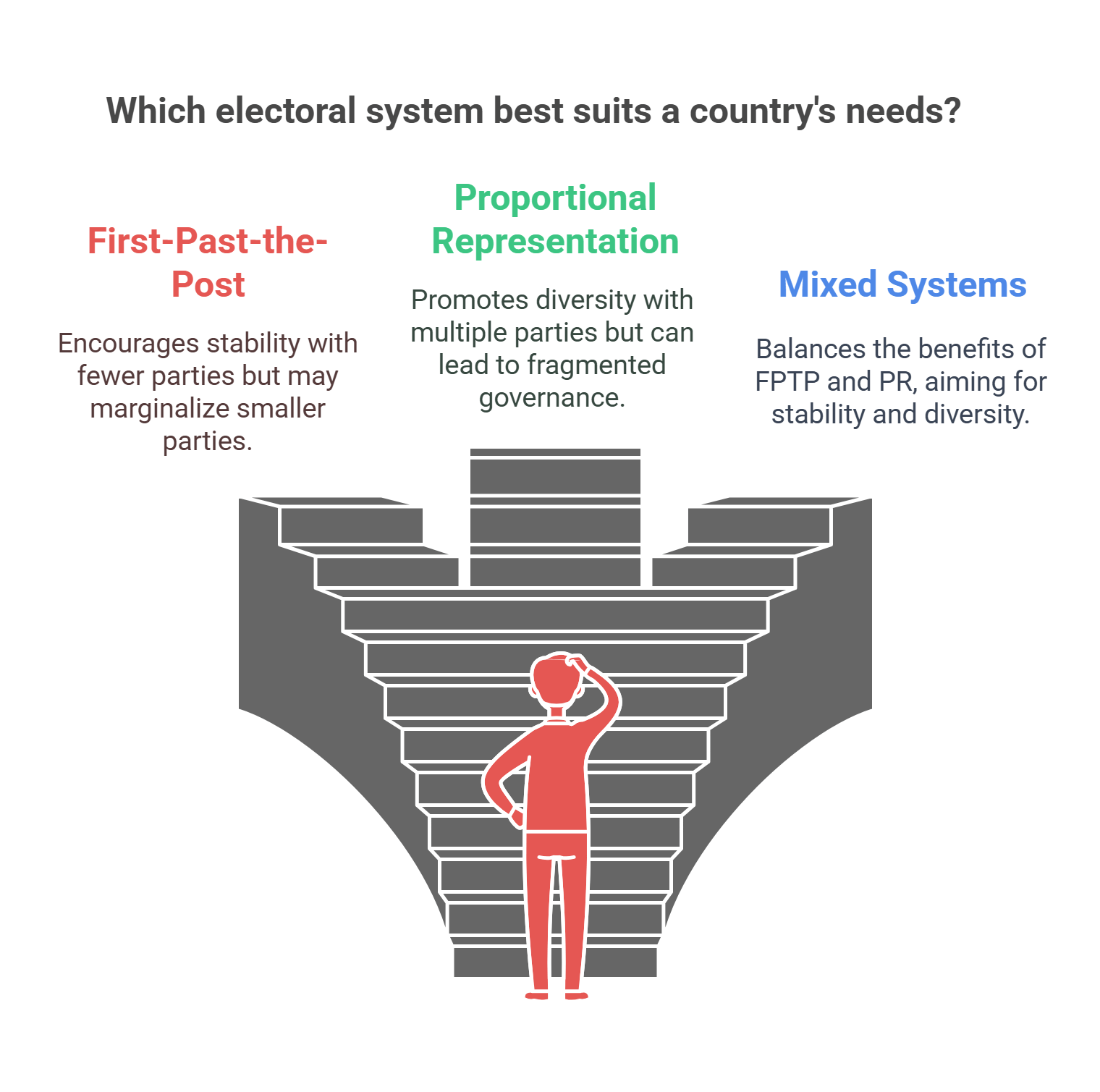
Social Movements
Detailed Explanation: Social movements are organized efforts by groups to bring about or
resist social, political, or cultural change. They often emerge in response to perceived injustices.
- Reform Movements: Seek incremental change (e.g., Civil Rights Movement).
- Revolutionary Movements: Aim for radical transformation (e.g., French Revolution).
- Resistance Movements: Oppose changes or policies (e.g., Anti-Apartheid Movement).
📘 Example: The environmental movement advocates for climate action and sustainability.
Explained Simply: Social movements are like waves of collective action that reshape society.
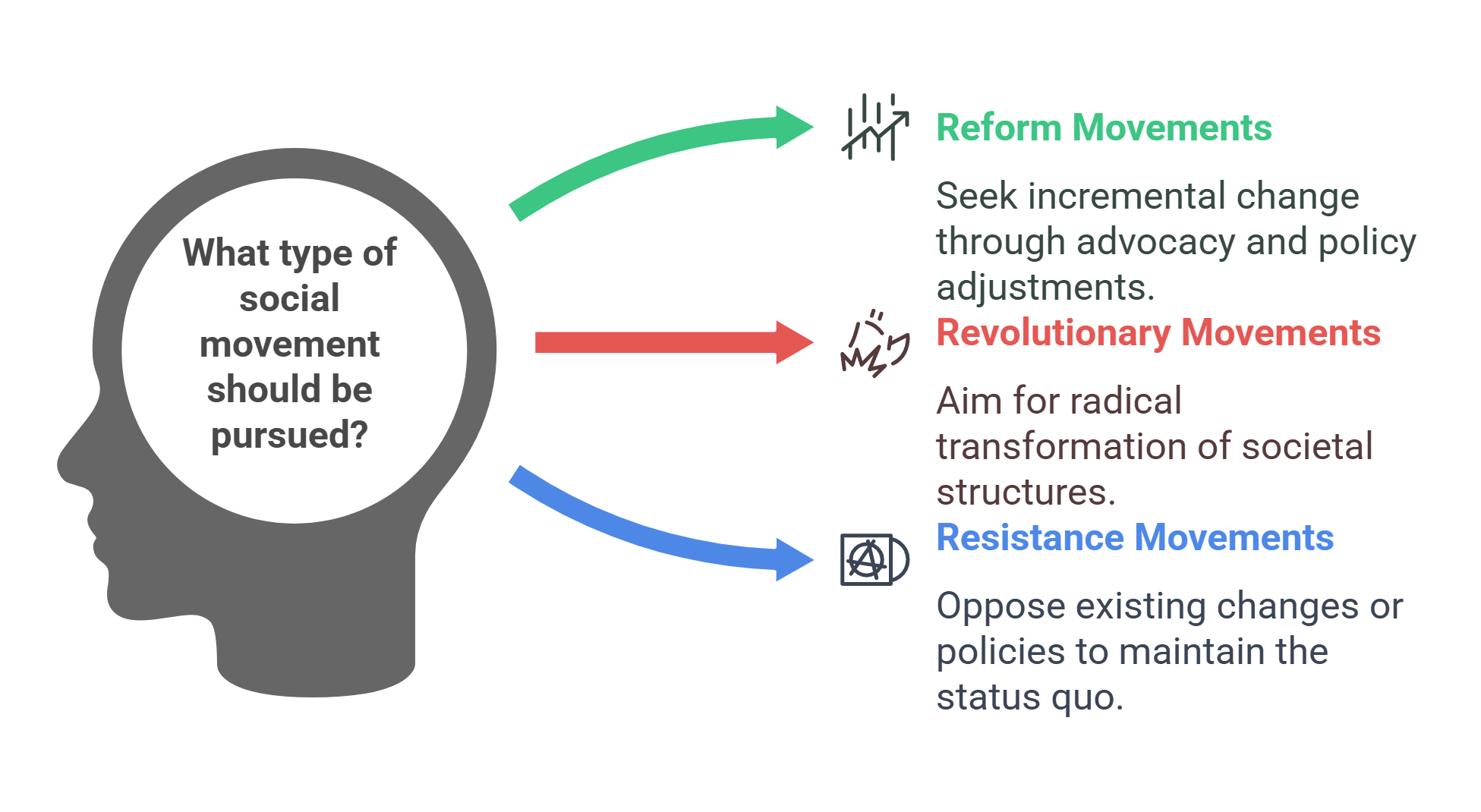
Civil Society
Detailed Explanation: Civil society encompasses non-governmental organizations,
associations, and institutions that represent citizens’ interests and operate independently of the state.
- Roles: Advocating for rights and justice; providing services and filling gaps left by governments.
📘 Example: NGOs, trade unions, and community organizations.
Explained Simply: Civil society is like the voice of the people, amplifying concerns outside government structures.
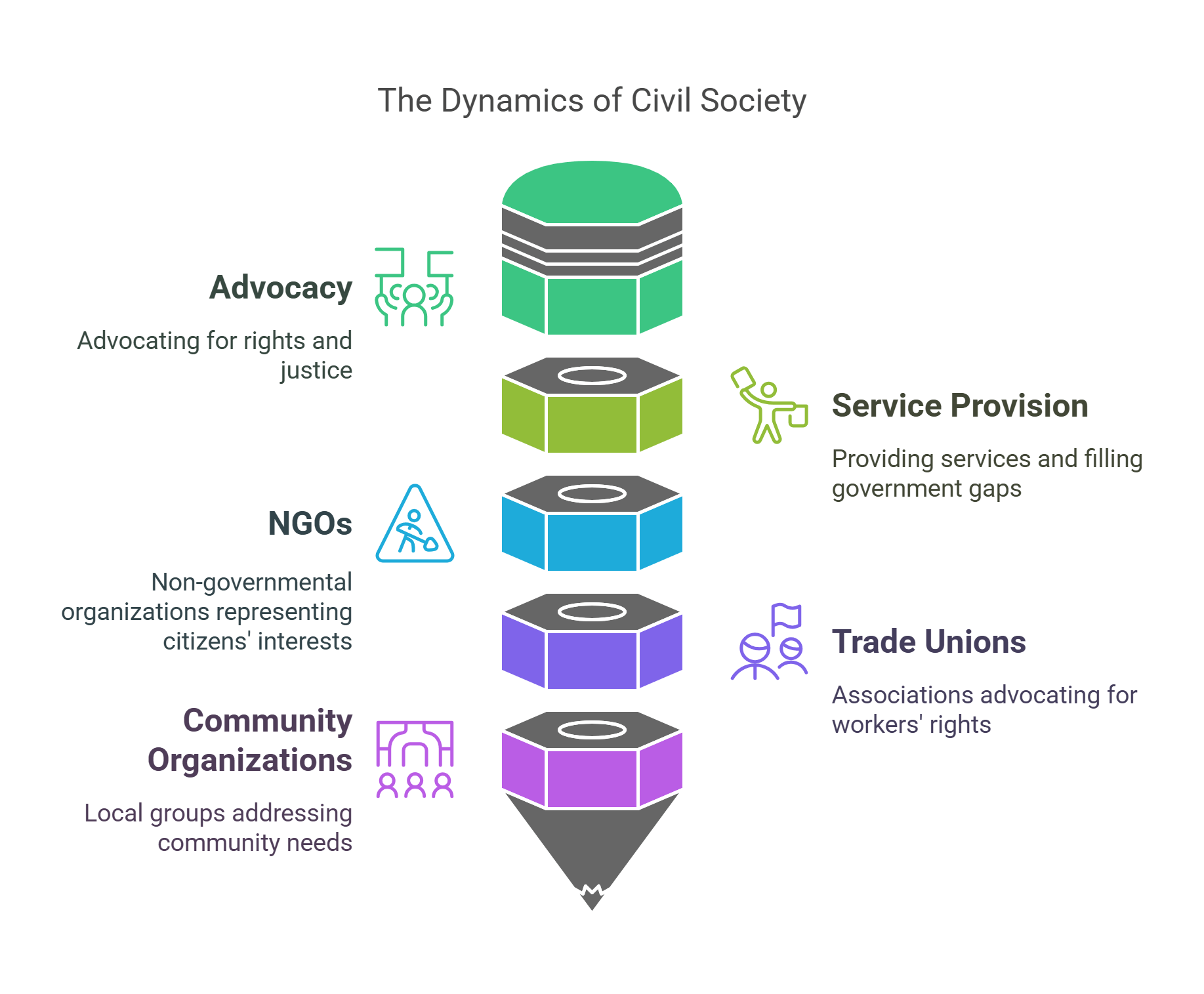
State vs. Nation
Detailed Explanation: A state refers to a political entity with a defined territory,
government, and sovereignty. A nation, on the other hand, is a group of people united by shared culture,
language, or history.
- State: Political and legal organization (e.g., United States).
- Nation: Cultural and social identity (e.g., Kurdish nation).
- Nation-State: When a state and nation overlap (e.g., Japan).
📘 Example: A state is like a house, while a nation is the family that lives inside.
Explained Simply: A state is like a house, while a nation is the family that lives inside.
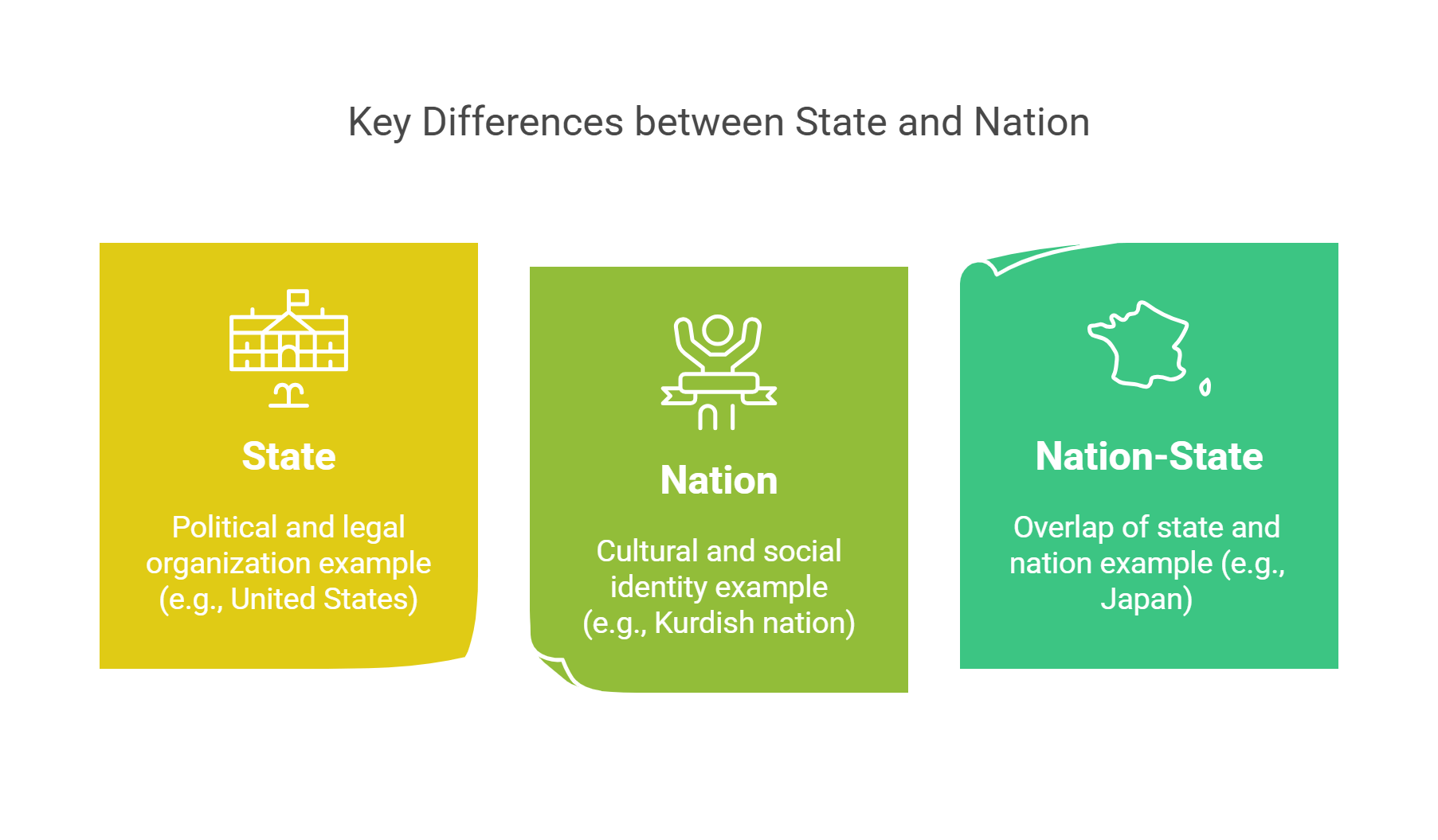
Marxism vs. Pluralism
Detailed Explanation: Marxism and pluralism provide contrasting views on power dynamics and
governance:
- Marxism: Views political systems as tools of the ruling class to maintain economic dominance,
emphasizing class struggle. - Pluralism: Sees power as distributed among multiple groups, ensuring balance and competition in
decision-making.
📘 Example: Marxism critiques capitalism for creating inequality, while pluralism highlights how
democracy accommodates diverse interests.
Explained Simply: Marxism is like a single voice dominating a choir, while pluralism is theharmony of competing voices.
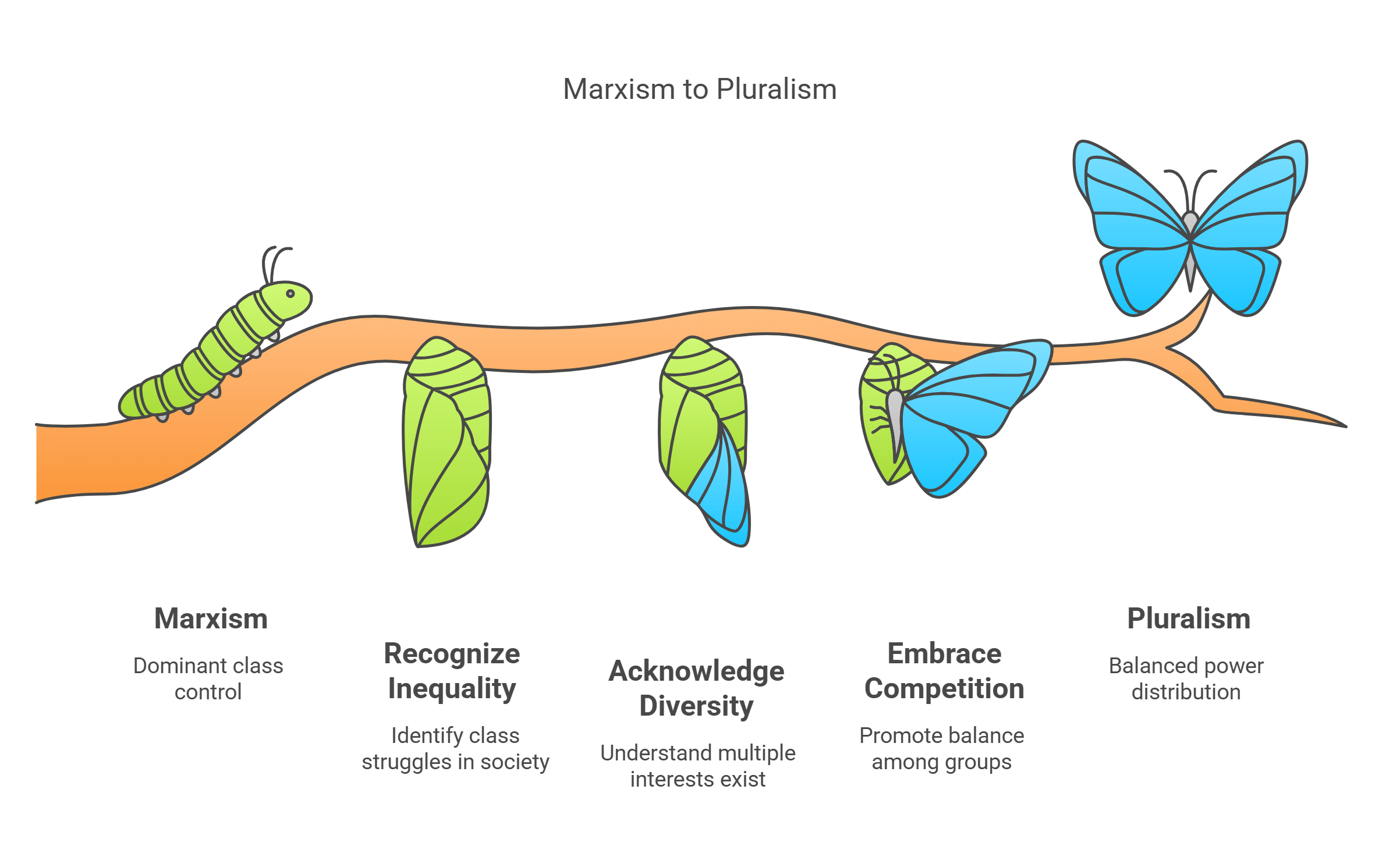
Social Contract Theory
Detailed Explanation: Social contract theory posits that individuals consent to form societies
and governments to ensure order and mutual benefit. Key theorists include:
- Thomas Hobbes: Advocated for a strong central authority to prevent chaos.
- John Locke: Emphasized individual rights and limited government.
- Jean-Jacques Rousseau: Highlighted collective will and direct democracy.
📘 Example: Locke’s ideas influenced the U.S. Declaration of Independence.
Explained Simply: Social contract theory is like agreeing to traffic rules for safer roads.
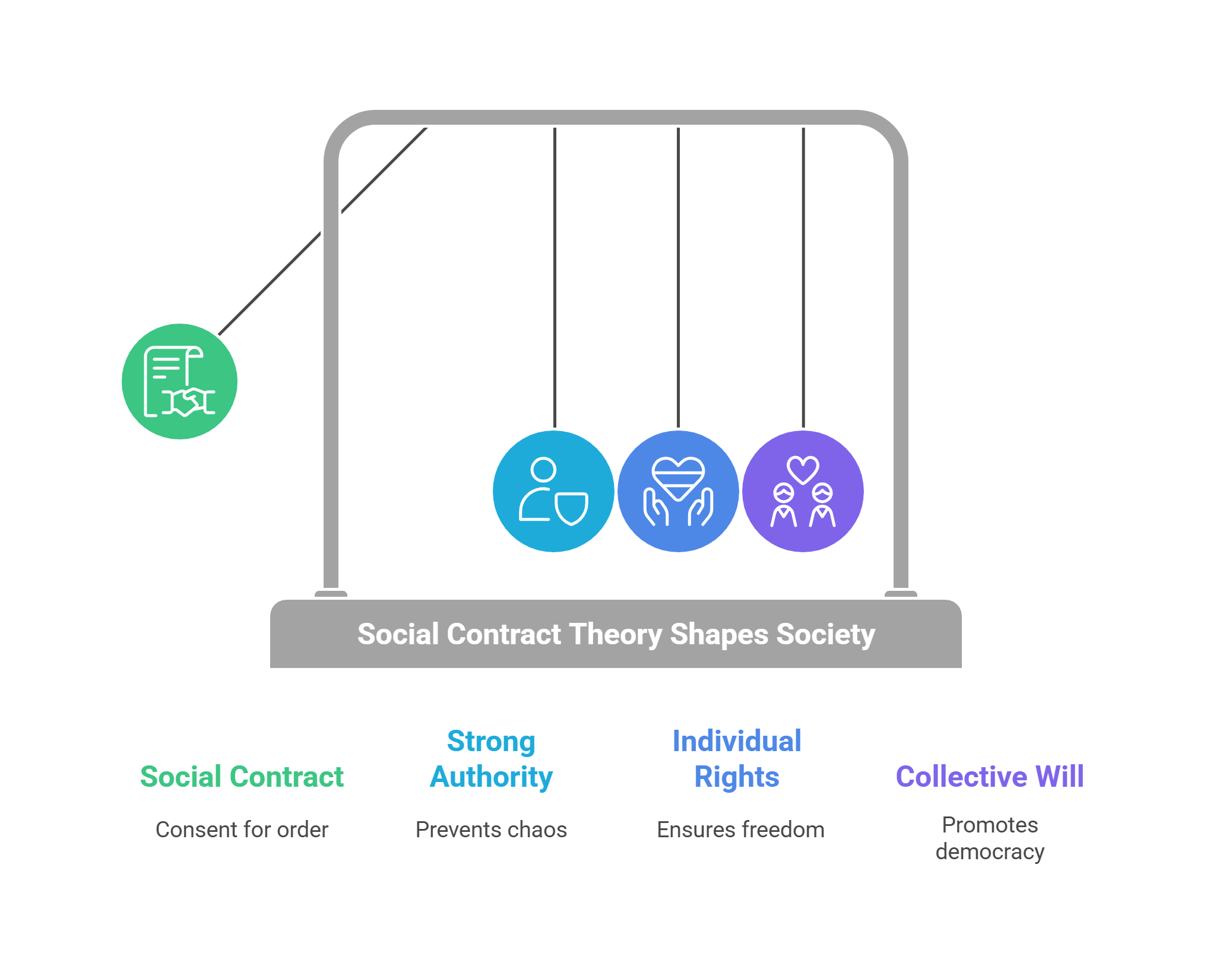
Protest Tactics
Detailed Explanation: Protest tactics are strategies used by social movements and activists to
advocate for change. They range from peaceful demonstrations to disruptive actions.
- Nonviolent Resistance: Marches, sit-ins, and boycotts (e.g., Gandhi’s Salt March).
- Civil Disobedience: Intentionally breaking laws to highlight injustice (e.g., Rosa Parks’
bus protest). - Direct Action: Blocking construction or occupying spaces.
Explained Simply: Protest tactics are like tools in a toolbox, chosen based on the situation and goals.
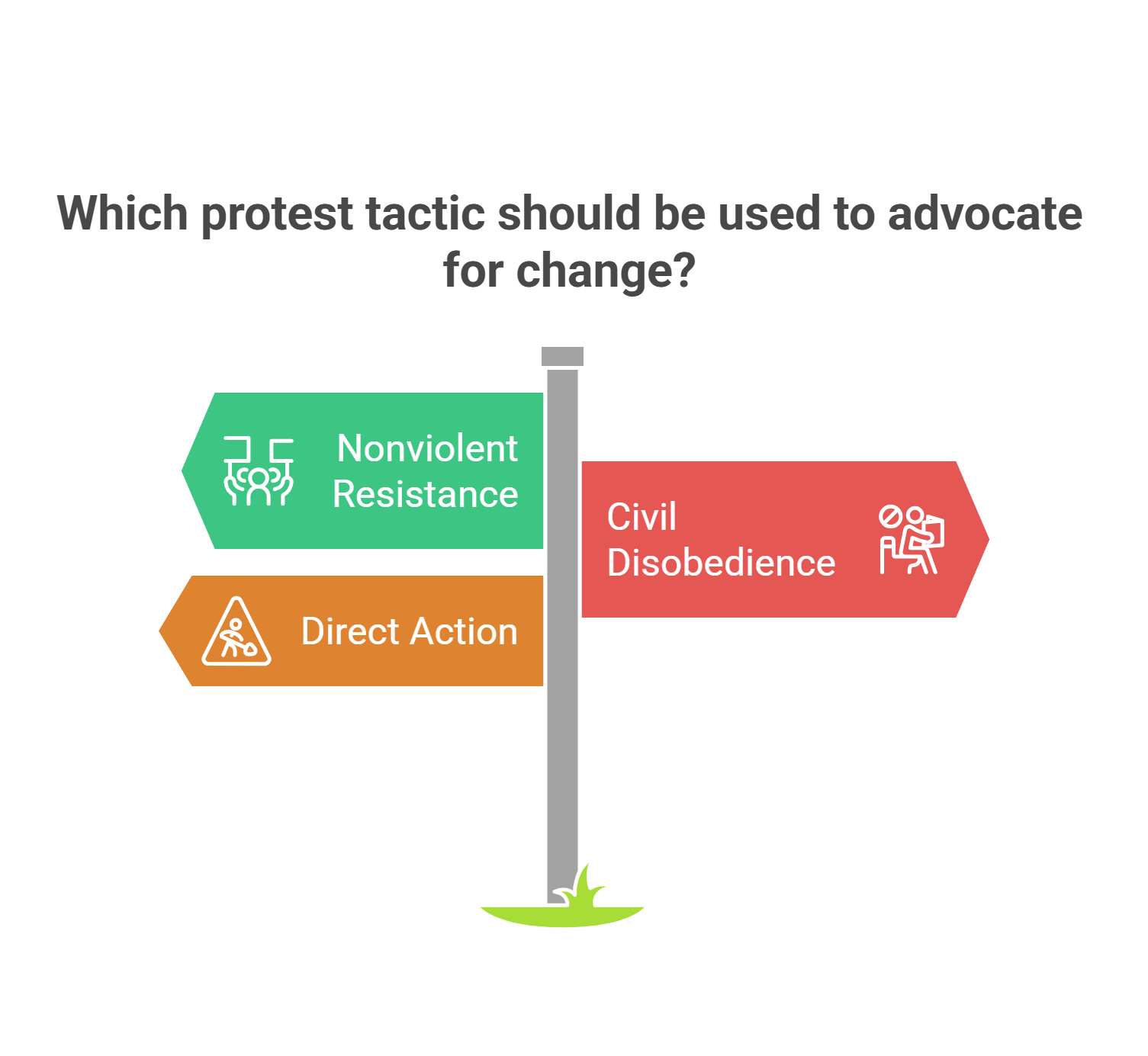
Citizenship
Detailed Explanation: Citizenship refers to an individual’s membership in a political
community, entailing rights, responsibilities, and participation in governance.
- Types:
- Birthright Citizenship: Acquired by being born in a country.
- Naturalized Citizenship: Granted through legal processes.
- Rights and Duties: Voting, freedom of expression, and adherence to laws.
📘 Example: In democracies, citizenship includes the right to vote and participate in civic life.
Explained Simply: Citizenship is like membership in a club, with privileges and obligations.
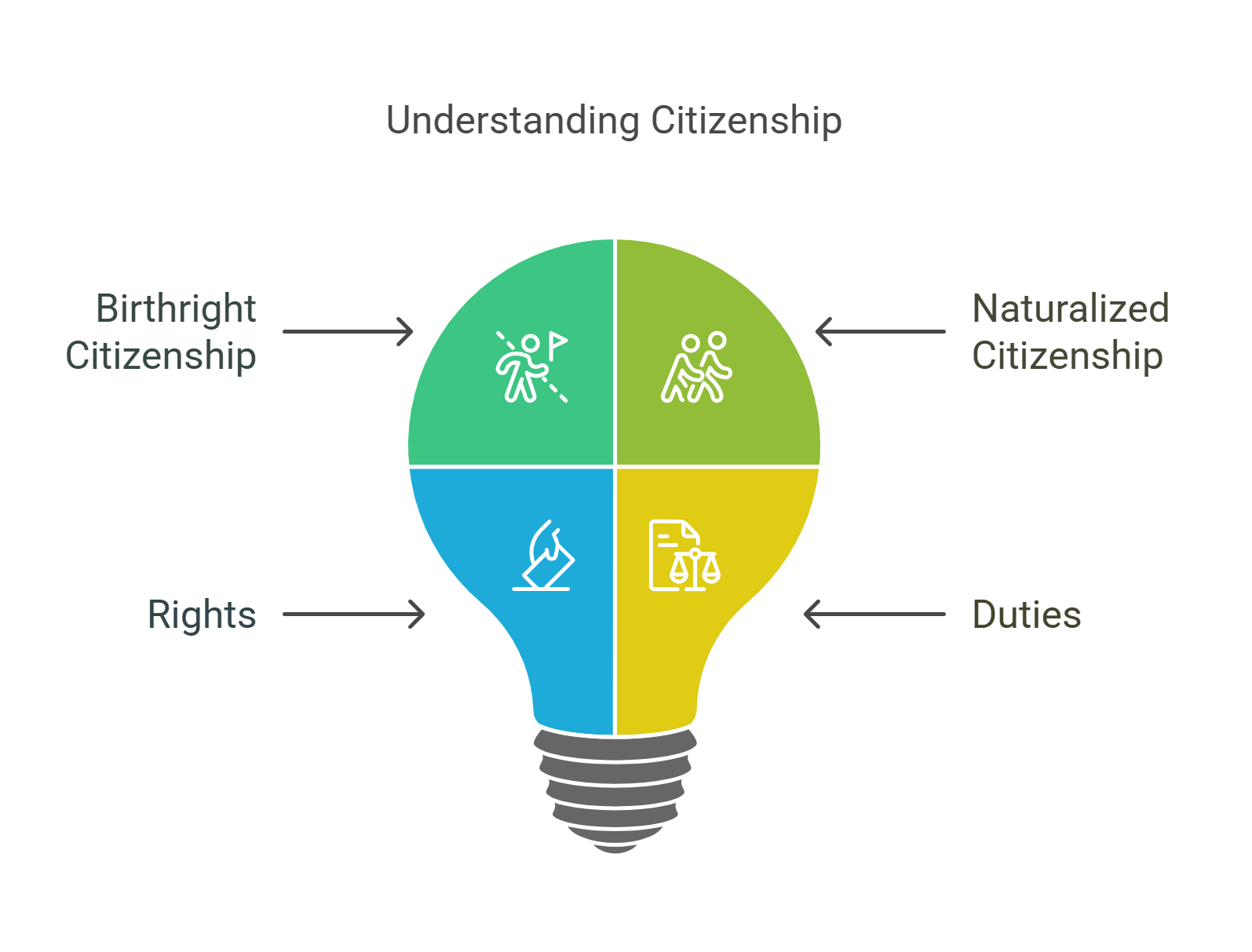
✨ Conclusion
Political sociology provides a lens to analyze the interplay between society and politics. By understanding
concepts like power vs. authority, electoral systems, and social movements, readers can critically engage with
RC passages and real-world political dynamics. These concepts illuminate how individuals and groups influence
governance, empowering readers to explore the foundations of social change and political organization.












